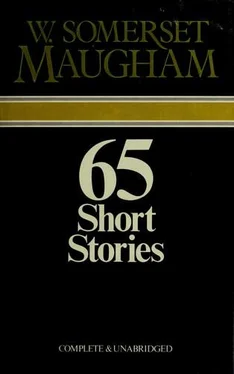Somerset Maugham - Sixty-Five Short Stories
Здесь есть возможность читать онлайн «Somerset Maugham - Sixty-Five Short Stories» весь текст электронной книги совершенно бесплатно (целиком полную версию без сокращений). В некоторых случаях можно слушать аудио, скачать через торрент в формате fb2 и присутствует краткое содержание. Жанр: Фантастика и фэнтези, на русском языке. Описание произведения, (предисловие) а так же отзывы посетителей доступны на портале библиотеки ЛибКат.
- Название:Sixty-Five Short Stories
- Автор:
- Жанр:
- Год:неизвестен
- ISBN:нет данных
- Рейтинг книги:4.5 / 5. Голосов: 2
-
Избранное:Добавить в избранное
- Отзывы:
-
Ваша оценка:
- 100
- 1
- 2
- 3
- 4
- 5
Sixty-Five Short Stories: краткое содержание, описание и аннотация
Предлагаем к чтению аннотацию, описание, краткое содержание или предисловие (зависит от того, что написал сам автор книги «Sixty-Five Short Stories»). Если вы не нашли необходимую информацию о книге — напишите в комментариях, мы постараемся отыскать её.
Sixty-Five Short Stories — читать онлайн бесплатно полную книгу (весь текст) целиком
Ниже представлен текст книги, разбитый по страницам. Система сохранения места последней прочитанной страницы, позволяет с удобством читать онлайн бесплатно книгу «Sixty-Five Short Stories», без необходимости каждый раз заново искать на чём Вы остановились. Поставьте закладку, и сможете в любой момент перейти на страницу, на которой закончили чтение.
Интервал:
Закладка:
He had but lately come out from England to manage the local branch of an English bank, and, reaching Samoa at the beginning of the dry season, he had taken a room at the hotel. He quickly made the acquaintance of all and sundry. The life of the island is pleasant and easy. He enjoyed the long idle talks in the lounge of the hotel and the gay evenings at the English Club when a group of fellows would play pool. He liked Apia straggling along the edge of the lagoon, with its stores and bungalows, and its native village. Then there were weekends when he would ride over to the house of one planter or another and spend a couple of nights on the hills. He had never before known freedom or leisure. And he was intoxicated by the sunshine. When he rode through the bush his head reeled a little at the beauty that surrounded him. The country was indescribably fertile. In parts the forest was still virgin, a tangle of strange trees, luxuriant undergrowth, and vine; it gave an impression that was mysterious and troubling.
But the spot that entranced him was a pool a mile or two away from Apia to which in the evenings he often went to bathe. There was a little river that bubbled over the rocks in a swift stream, and then, after forming the deep pool, ran on, shallow and crystalline, past a ford made by great stones where the natives came sometimes to bathe or to wash their clothes. The coconut trees, with their frivolous elegance, grew thickly on the banks, all clad with trailing plants, and they were reflected in the green water. It was just such a scene as you might see in Devonshire among the hills and yet with a difference, for it had a tropical richness, a passion, a scented languor which seemed to melt the heart. The water was fresh, but not cold; and it was delicious after the heat of the day. To bathe there refreshed not only the body but the soul.
At the hour when Lawson went, there was not a soul and he lingered for a long time, now floating idly in the water, now drying himself in the evening sun, enjoying the solitude and the friendly silence. He did not regret London then, nor the life that he had abandoned, for life as it was seemed complete and exquisite.
It was here that he first saw Ethel.
Occupied till late by letters which had to be finished for the monthly sailing of the boat next day, he rode down one evening to the pool when the light was almost failing. He tied up his horse and sauntered to the bank. A girl was sitting there. She glanced round as he came and noiselessly slid into the water. She vanished like a naiad startled by the approach of a mortal. He was surprised and amused. He wondered where she had hidden herself. He swam downstream and presently saw her sitting on a rock. She looked at him with uncurious eyes. He called out a greeting in Samoan.
'Talofa.'
She answered him, suddenly smiling, and then let herself into the water again. She swam easily and her hair spread out behind her. He watched her cross the pool and climb out on the bank. Like all the natives she bathed in a
Mother Hubbard, and the water had made it cling to her slight body. She wrung out her hair, and as she stood there, unconcerned, she looked more than ever like a wild creature of the water or the woods. He saw now that she was half-caste. He swam towards her and, getting out, addressed her in English.
'You're having a late swim.'
She shook back her hair and then let it spread over her shoulders in luxuriant curls.
'I like it when I'm alone,' she said.
'So do I.'
She laughed with the childlike frankness of the native. She slipped a dry Mother Hubbard over her head and, letting down the wet one, stepped out of it. She wrung it out and was ready to go. She paused a moment irresolutely and then sauntered off. The night fell suddenly.
Lawson went back to the hotel and, describing her to the men who were in the lounge shaking dice for drinks, soon discovered who she was. Her father was a Norwegian called Brevald who was often to be seen in the bar of the Hotel Metropole drinking rum and water. He was a little old man, knotted and gnarled like an ancient tree, who had come out to the islands forty years before as mate of a sailing vessel. He had been a blacksmith, a trader, a planter, and at one time fairly well-to-do; but, ruined by the great hurricane of the nineties, he had now nothing to live on but a small plantation of coconut trees. He had had four native wives and, as he told you with a cracked chuckle, more children than he could count. But some had died and some had gone out into the world, so that now the only one left at home was Ethel.
'She's a peach,' said Nelson, the super-cargo of the Moana. 'I've given her the glad eye once or twice, but I guess there's nothing doing.'
'Old Brevald's not that sort of a fool, sonny,' put in another, a man called Miller. 'He wants a son-in-law who's prepared to keep him in comfort for the rest of his life.'
It was distasteful to Lawson that they should speak of the girl in that fashion. He made a remark about the departing mail and so distracted their attention. But next evening he went again to the pool. Ethel was there; and the mystery of the sunset, the deep silence of the water, the lithe grace of the coconut trees, added to her beauty, giving it a profoundity, a magic, which stirred the heart to unknown emotions. For some reason that time he had the whim not to speak to her. She took no notice of him. She did not even glance in his direction. She swam about the green pool. She dived, she rested on the bank, as though she were quite alone: he had a queer feeling that he was invisible. Scraps of poetry, half forgotten, floated across his memory, and vague recollections of the Greece he had negligently studied in his school days. When she had changed her wet clothes for dry ones and sauntered away he found a scarlet hibiscus where she had been. It was a flower that she had worn in her hair when she came to bathe and, having taken it out on getting into the water, had forgotten or not cared to put in again. He took it in his hands and looked at it with a singular emotion. He had an instinct to keep it, but his sentimentality irritated him, and he flung it away. It gave him quite a little pang to see it float down the stream.
He wondered what strangeness it was in her nature that urged her to go down to this hidden pool when there was no likelihood that anyone should be there. The natives of the islands are devoted to the water. They bathe, somewhere or other, every day, once always, and often twice; but they bathe in bands, laughing and joyous, a whole family together; and you often saw a group of girls, dappled by the sun shining through the trees, with the half-castes among them, splashing about the shallows of the stream. It looked as though there were in this pool some secret which attracted Ethel against her will.
Now the night had fallen, mysterious and silent, and he let himself down in the water softly, in order to make no sound, and swam lazily in the warm darkness. The water seemed fragrant still from her slender body. He rode back to the town under the starry sky. He felt at peace with the world.
Now he went every evening to the pool and every evening he saw Ethel. Presently he overcame her timidity. She became playful and friendly. They sat together on the rocks above the pool, where the water ran fast, and they lay side by side on the ledge that overlooked it, watching the gathering dusk envelop it with mystery. It was inevitable that their meetings should become known-in the South Seas everyone seems to know everyone's business-and he was subjected to much rude chaff by the men at the hotel. He smiled and let them talk. It was not even worth while to deny their coarse suggestions. His feelings were absolutely pure. He loved Ethel as a poet might love the moon. He thought of her not as a woman but as something not of this earth. She was the spirit of the pool.
Читать дальшеИнтервал:
Закладка:
Похожие книги на «Sixty-Five Short Stories»
Представляем Вашему вниманию похожие книги на «Sixty-Five Short Stories» списком для выбора. Мы отобрали схожую по названию и смыслу литературу в надежде предоставить читателям больше вариантов отыскать новые, интересные, ещё непрочитанные произведения.
Обсуждение, отзывы о книге «Sixty-Five Short Stories» и просто собственные мнения читателей. Оставьте ваши комментарии, напишите, что Вы думаете о произведении, его смысле или главных героях. Укажите что конкретно понравилось, а что нет, и почему Вы так считаете.









